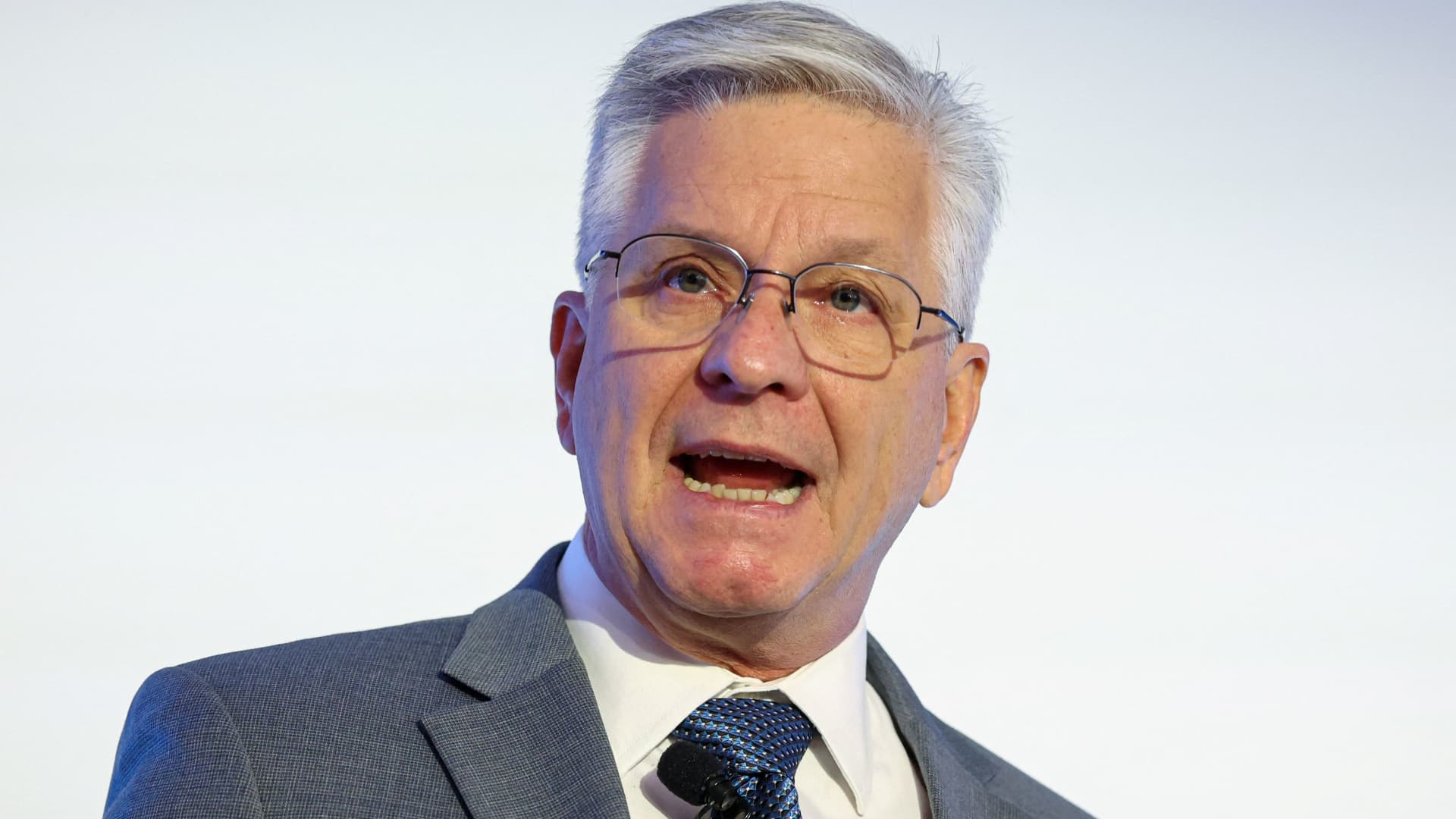A person beats a drum with the euro logo crossed out in red on the drumhead during a demonstration against Bulgaria entering the Eurozone in Sofia on May 31, 2025.
Nikolay Doychinov | Afp | Getty Images
Bulgaria is set to become the 21st member of the euro zone after receiving sign off from the European Commission and European Central Bank last week — but not everyone is convinced the move is a good idea.
Bulgaria’s Prime Minister Rosen Zhelyazkov, member of the center-right GERB party, has made joining the euro zone a priority, arguing that it would boost economic stability and growth.
However, fears of higher prices and a loss of independence have stoked nationalist-party fueled protests against the country’s euro ascension. A recent European Union survey showed that half of Bulgaria’s population is against adopting the euro.
Economists and experts weighed in on the potential risks to Bulgaria joining the euro, outlining what the eastern European country could lose and gain from the move.
Inflation and interest rates
“The most immediate concern is a spike in prices during the currency switch, as some businesses may round up prices. Many Bulgarians worry that eurozone membership could erode their purchasing power, especially in poorer rural areas,” Valentin Tataru, an economist at ING who covers Bulgaria, told CNBC.
Nevertheless, he also noted Bulgaria’s currency has long had a fixed exchange rate to the euro and therefore, “the transitional inflation bump should be mild.”

The second key concern is what giving up Bulgaria’s currency, the lev, will mean for the country’s independence and sovereignty — ideals for which it has become symbolic according to Andrius Tursa, central and eastern Europe advisor at Teneo.
“Its replacement with the euro may be perceived by parts of the population as a loss of national control,” he told CNBC. In addition there are concerns about relinquishing control of monetary policy as countries in the euro zone are subject to decisions by the ECB, Tursa added.
The Bulgarian National Bank (BNB) would for example no longer solely be responsible for setting the country’s interest rates based only on how its individual economy is developing.
However, “eurozone countries benefit from lower interest rates due to the credibility of the ECB and reduced currency risk,” Tursa pointed out. Lower interest rates typically benefit borrowers as loans and mortgages become more affordable.
Economic stability and power
Joining the euro zone and securing oversight from the ECB could boost economic stability and growth prospects for Bulgaria, Jasmin Groeschl, senior economist for Europe at Allianz SE, told CNBC.
Foreign investment could for example increase, she suggested, and the country’s gross domestic product would be expected to be boosted by euro zone membership.
“Deeper financial integration would strengthen Bulgaria’s financial system under the ECB’s oversight, enhancing monetary stability,” Groeschl explained. “Adopting the euro would strengthen Bulgaria’s ties with the EU, enhancing its influence and credibility,” she added.
Key areas that underpin the economy like trade and tourism could also be supported, Teneo’s Tursa said.
Many of Bulgaria’s key trading partners are in the EU, with most of its exports going to members of the 27-state bloc in 2023 according to data from the country’s statistics office. Key sectors include machinery and transport equipment, manufactured goods and food.
Tourism has meanwhile become a major contributor to the economy as Bulgaria positions itself as both a summer and winter destination. Over 13 million foreigners visited the country in 2024, official statistics showed.
“Bulgaria’s accession to the eurozone would facilitate trade and tourism flows with other eurozone countries by eliminating the costs and burden associated with currency conversion,” Tursa said, adding that this would be particularly important due to Bulgaria’s strong integration into EU supply chains.
Political tensions
One risk flagged by the economists and analysts are the political tensions surrounding Bulgaria’s euro adoption.
“Public opposition to euro adoption has already triggered notable protests, and in the medium term, the issue could become a key driver of rising support for populist and Euroskeptic political movements,” Teneo’s Tursa explained.
But despite local protests and concerns about euro zone ascension, at least in the long term the benefits for the country outweigh any negatives, Allianz SE’s Groeschl argued.
“The trade-off involves losing some economic autonomy in exchange for deeper integration,” she said. “Although Bulgaria would lose some monetary policy control and be subject to strict fiscal rules, the advantages of greater economic stability, reduced transaction costs and stronger integration with the EU market would typically outweigh these disadvantages.”
ING’s Tataru struck a similar tone, saying that because the lev is already tied to the euro, there should not be a major shock.
“Joining the euro is one of the most strategic steps Bulgaria can take to secure long-term prosperity and deeper European integration,” he said.

 Blog Post1 week ago
Blog Post1 week ago
 Personal Finance1 week ago
Personal Finance1 week ago
 Economics1 week ago
Economics1 week ago
 Economics1 week ago
Economics1 week ago
 Economics4 days ago
Economics4 days ago
 Finance4 days ago
Finance4 days ago
 Economics4 days ago
Economics4 days ago
 Economics4 days ago
Economics4 days ago





















